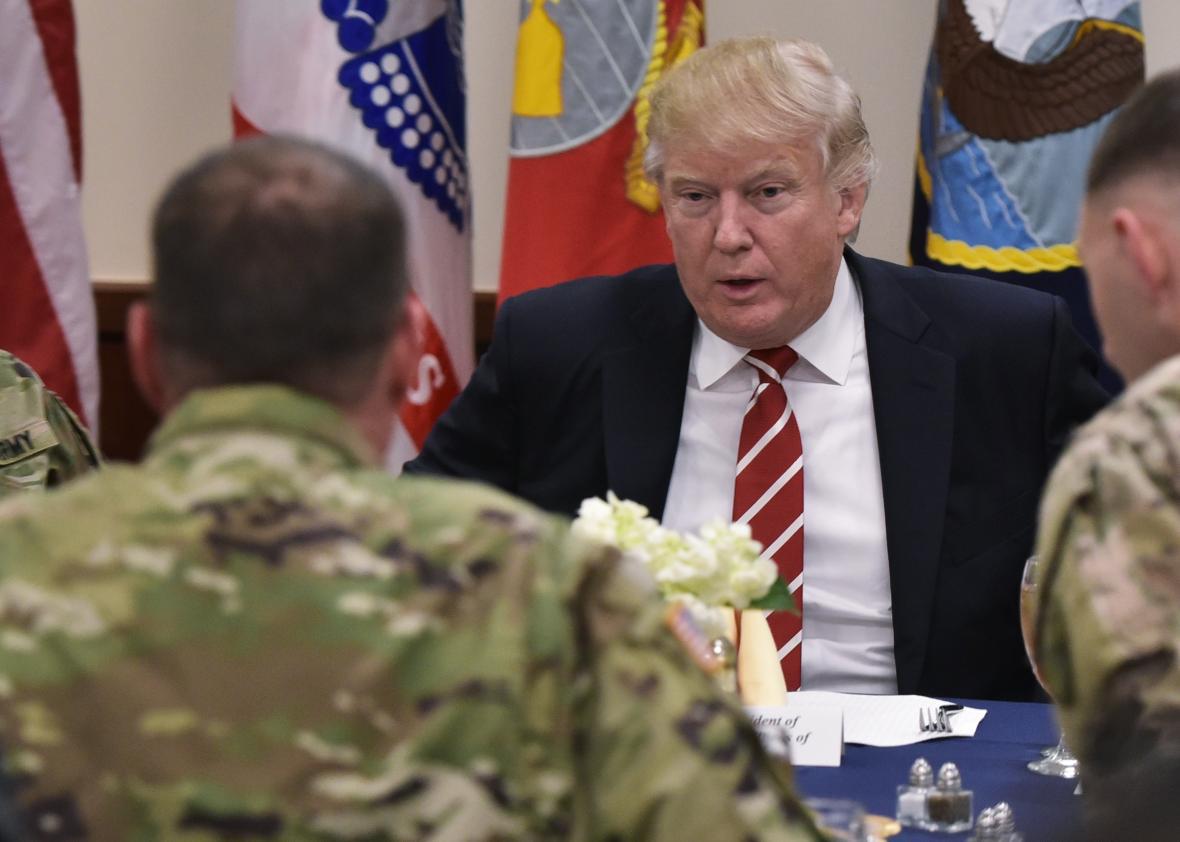Donald Trump may have once claimed during the campaign to “know more about ISIS than the generals do.” But since his election it’s become clear that the president has a bit of a thing for men in uniform.
He’s stocked his administration’s senior positions with an unusual number of guys who were recently wearing stars, or in the case of National Security Adviser H.R. McMaster, still are. (Trump reportedly wanted McMaster’s predecessor, Michael Flynn, to wear his uniform in public and had to be told that this wouldn’t be proper, as Flynn is retired.) He has proposed a major increase in military spending, paid for by major cuts to other agencies including the State Department, further militarizing the conduct of American foreign policy. He peppers his speeches with promises to rebuild American military might. Now, he also appears to be more or less abdicating his role of commander in chief to let the generals call the shots.
Following a day in which Trump first deflected responsibility for a raid in which a Navy SEAL was killed onto military commanders, then later basked in the applause for the SEAL’s wife when he pointed her out during an address to Congress, the Daily Beast reports that that the White House is considering giving Defense Secretary James Mattis a freer hand to launch time-sensitive missions targeting ISIS. This follows reports from shortly after the Yemen raid that said the White House “wants to speed the decision-making when it comes to such strikes, delegating more power to lower-level officials.”
The Daily Beast’s Kim Dozier writes that Trump “wants to operate more like the CEO he was in the private sector in such matters, and delegate even more power to Mattis, which may mean rewriting one of President Barack Obama’s classified Presidential Policy Directives on potentially lethal operations in countries where the U.S. is not officially involved in combat.”
Military officers already have authority to greenlight certain military operations, but sensitive missions like the Yemen raid, conducted in a country where the United States is not formally engaged in combat operations, have typically required a sign-off from the White House. Trump has also previously said that he would give Mattis the power to “override” him on the question of whether to use torture on terror suspects. (The president still thinks it’s a good idea, but the defense secretary opposes it.)
The president is the commander in chief of the country’s armed forces, and civilian control of the military is an important constitutional principle in the United States—or any functional democracy for that matter. The secretary of defense does not, and should not, have the power to “override” the president. It should also give pause that the only civilian signing off on these decisions is Mattis, who retired from the military so recently that he needed Congress to grant a special waiver for him to assume his current position.
Ordinarily, a president this deferential to military commanders and blasé about civilian control of the military would be troubling, but given the civilian in question, it’s hard to get too worked up about it. A president willing to overturn longstanding U.S. foreign policy positions with little to no consideration or counsel beforehand, or discuss sensitive national security issues in the middle of a restaurant in full view of fellow diners, perhaps shouldn’t be the one signing off on life-or-death military decisions. And if, as the response the Owens’ death shows, he’s unwilling to take responsibility when things go badly wrong in missions he’s ordered, perhaps he shouldn’t be involved in ordering them at all. The times when Mattis and the Pentagon have managed to push back against Trump—whether on torture, “black sites,” or barring Iraqis who’ve helped the U.S. military from entering the United States—it’s usually been for the better.
In the long run, Trump’s attitude has disturbing implications for civil-military relations, and the out-of-control militarization of American foreign policy. But right now, we have more immediate problems.
